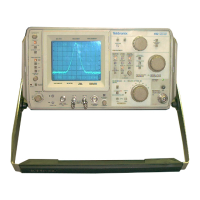Section 10: Instrument programming Model 2601B-PULSE System SourceMeter Instrument Reference Manual
10-50 2601B-PULSE-901-01A April 2020
Using the reset() command
Most TSP-Link
®
system operations target a single node in the system, but the reset() command
affects the system as a whole by resetting all nodes to their default settings:
-- Reset all nodes in a TSP-Link system to their default state.
reset()
Using the reset() command in a TSP-Link network differs from using the tsplink.reset()
command. The tsplink.reset() command reinitializes the TSP-Link network and will turn off the
output of any TSP-linked instrument; it may change the state of individual nodes in the system.
Use node[N].reset() or localnode.reset() to reset only one of the nodes. The other nodes
are not affected. The following programming example shows this type of reset operation with code
that is run on node 1.
-- Reset node 1 only.
node[1].reset()
-- Reset the node you are connected to (in this case, node 1).
localnode.reset()
-- Reset node 4 only.
node[4].reset()
Using the abort command
An abort command terminates an executing script and returns all nodes to local operation (REM
indicators turn off). This dissolves the master/subordinate relationships between nodes. To invoke an
abort operation, either send an abort command to a specific node or press the EXIT (LOCAL) key
on any node in the system.
You can also perform an abort operation by pressing the OUTPUT ON/OFF control on any node. The
results are the same as above, with the addition that all source-measure unit (SMU) outputs in the
system are turned off.
Triggering with TSP-Link
The TSP-Link
®
expansion interface has three trigger lines that function similarly to the digital I/O
synchronization lines. See Digital I/O (on page 6-36) and Triggering (on page 6-1) for more
information.

